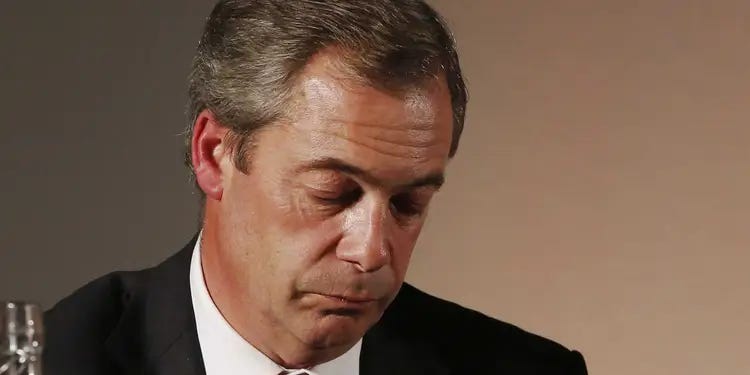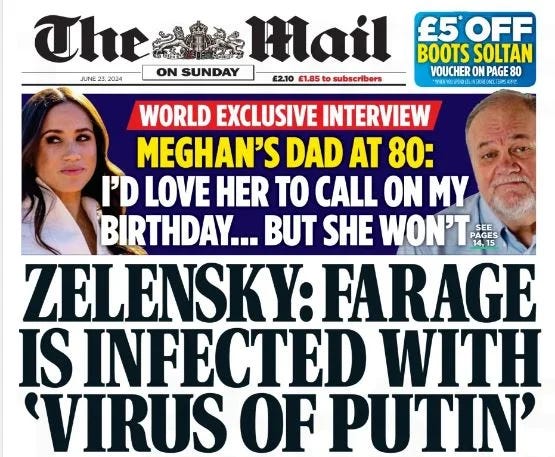Is support for Reform SLIDING?
What the latest polls suggest after Nigel Farage's Ukraine comments
Matt Goodwin’s Substack goes to more than 56,000+ subscribers from 167 countries around the world and thousands of paying supporters who support our work. Like our stuff? Then help us expand by becoming a paid supporter and access everything —the full archive, exclusive posts, polling, leave comments, join the debate, get discounts, advance notice about events, and the knowledge you’re supporting independent writers who are not afraid to push back against the grain. You can join us on YouTube, Instagram, TikTok, Twitter/X and Facebook.
It’s been a hectic few days in Farage Land, with the leader of Reform becoming the subject of intense criticism after his comments about Russia’s invasion of Ukraine.
It began last Friday, June 21, when Nigel Farage challenged the consensus by suggesting to Nick Robinson on BBC’s Panorama that the West had provoked Russia’s full-scale invasion of Ukraine —that the expansion of the European Union and NATO had given Putin a “reason” to tell the Russian people “they’re coming for us again”.
When Farage was also asked if he admired Putin, the Reform leader said that while he “disliked” Putin “as a person” he “admired him as a political operator”.
Sensing an opportunity to derail Farage and his insurgent party, and prop up the collapsing Tories one week out from the election, more than a few members of the media and Tory elite class piled in, launching a sustained attack on Farage.
On Sunday, the Mail on Sunday ran with the headline: “Zelensky: Farage is infected with ‘virus of Putin”, even though Zelensky had very clearly said no such thing.
As Mary Harrington notes in UnHerd, if you actually read the story what you discover is that an anonymous source in Zelensky’s office had said “the virus of Putinism, unfortunately, infects people” — without specifying which “people”.
Nonetheless, while Farage promptly instructed his lawyers at Carter-Ruck, believing there to have been a breach of editorial standards, and subsequently compared the incident to the notorious Zinoviev letter, in 1924, the Mail also published an investigation claiming that more than twenty Reform candidates have expressed sympathy for Putin or his invasion. The newspaper also advised its readers how to vote tactically at the election to hurt Labour, help the Tories, and damage Farage’s revolt.
Farage, as Mary Harrington rightly notes, is certainly not the first to voice this counter-cultural view of Ukraine.
While his view rests on the unfashionable but well circulated ‘realist’ view of geopolitics, Nick Robinson (and much of the Tory elite class) cling to a ‘liberal internationalist’ view of geopolitics, which not only dominates the elite class but routinely downplays the historic failure of that class in a long line of foreign conflicts, from Iraq and Afghanistan, to Syria to Libya.
Indeed, you don’t have to agree with Farage’s view of Ukraine to agree with his broader point that the ‘forever wars’ that were overseen by liberal internationalists have been a total disaster and have made the world less, not more, stable.
Nor do you have to agree with his comments to accept Farage’s point that, actually, there should be a more robust debate about foreign policy.
So far, the 2024 election appears utterly bizarre for having had no serious discussion at all about either Ukraine or Israel-Gaza. In this election, remarkably, foreign policy issues have been significant because of their absence.
Either way, in the days since the story has escalated. Writing in the Telegraph, at the weekend, Farage, while denying he holds any sympathy for Putin —and describing his invasion as “immoral, outrageous, and indefensible”—doubled down on his initial comments, refusing to “apologise for telling the truth” and insisting that unlike much of the establishment he had seen the invasion coming for years:
“What I have been saying for the past 10 years is that the West has played into Putin’s hands, giving him the excuse to do what he wanted to do anyway. Back in 2014, when the EU first offered Ukraine an accession agreement, I said in a speech in the European Parliament that “there will be a war in Ukraine”. Why? Because the expansion of NATO and the European Union was giving Putin a pretext he would not ignore.”
Which prompted Boris Johnson, Farage’s nemesis, to respond, jumping on Twitter/X to accuse Farage of being ‘morally repugnant’ and “parroting Putin’s lies”:
Which then prompted Farage, in response, to point out Boris Johnson said much the same in the past, that the EU’s expansion had played into Putin’s hands, while also attacking Johnson for putting mass immigration on steroids and betraying the millions of voters who voted Tory in 2019 (which is true).
Meanwhile, sensing weakness in the Reform camp, many in the media, including many Tory-supporting columnists, continued to round on Farage:
“Farage’s justification of Putin’s aggression is both historically inaccurate and dangerously inflammatory at a time when western resolve over supporting Ukraine has looked shaky. But it is also desperately offensive to the many thousands who have died trying to protect their country … Farage appeals to disillusioned Tory and Labour voters, many fed up with high immigration. But his comments on Putin should be a wake-up call, particularly to senior Tories flirting with the idea of installing him as leader. A lurch into Farageism would doom them to a long, lonely spell on the opposition benches”.
“Mr Farage does Ukraine and other emergent democracies a disservice by placing a bet on the wisdom of Mr Putin. In doing so he is aligning himself more with European hard-rightists such as Alternative for Germany than with the British public. He is sitting in the same charabanc as Jeremy Corbyn and George Galloway”
The Telegraph:
“…the Reform UK leader has overreached himself in the eyes of many Conservatives who might have been tempted to vote for his party with his ill-judged analysis of Russia’s invasion of Ukraine … the implication that a country seeking a Western-focused future can be construed as having brought its fate upon itself because of the assailant’s paranoia is an odd argument to be advanced by a champion of national sovereignty”
Then, yesterday, Farage seemingly escalated his comments when The Times reported he had suggested Ukraine should agree to a peace deal with Russia or run the risk that “every young Ukrainian man will be killed”:
“It may be that peace is some way away. All I’ve said ķkkķis that I was totally opposed to the Iraq war, vehemently opposed to the Libyan war and I just think some attempt to broker negotiations between these two sides needs to happen … Clearly, on territory, such as Crimea, that is going to be incredibly difficult … No-one is even talking about peace. All we are talking about is ‘Ukraine is going to win’. Really? I’m pretty sceptical about that.”
Whatever you personally think about Farage’s comments, or the war in Ukraine, when it comes to the UK’s 2024 election the more significant question is why Farage has continued to give oxygen to a story that clearly brings no benefit to either himself or his party.
While it was always likely Nick Robinson and the media class would try to trip him up on this or another issue, the decision to continue giving his comments oxygen ultimately rests with Farage and his team.
While the debate about Ukraine is an important one, the issue is also way down the list of priorities for all voters —including Farage’s own voters who are mainly concerned about what they see as the threat from mass immigration.
Until this intervention, Farage had been targeting these core issues relentlessly, which in my view is why Reform’s support had been continuously rising in the polls. When you are a new and small party in a first-past-the-post system you simply have to remain utterly focused on your core issues and ideally ones, like mass immigration, which concern a large majority of voters, not venture off into more divisive topics (debate them, but not during the final ten days of a general election campaign). Which raises the obvious question: has this episode damaged Reform in the polls?
Let’s take a look at the numbers in detail
Keep reading with a 7-day free trial
Subscribe to Matt Goodwin to keep reading this post and get 7 days of free access to the full post archives.



